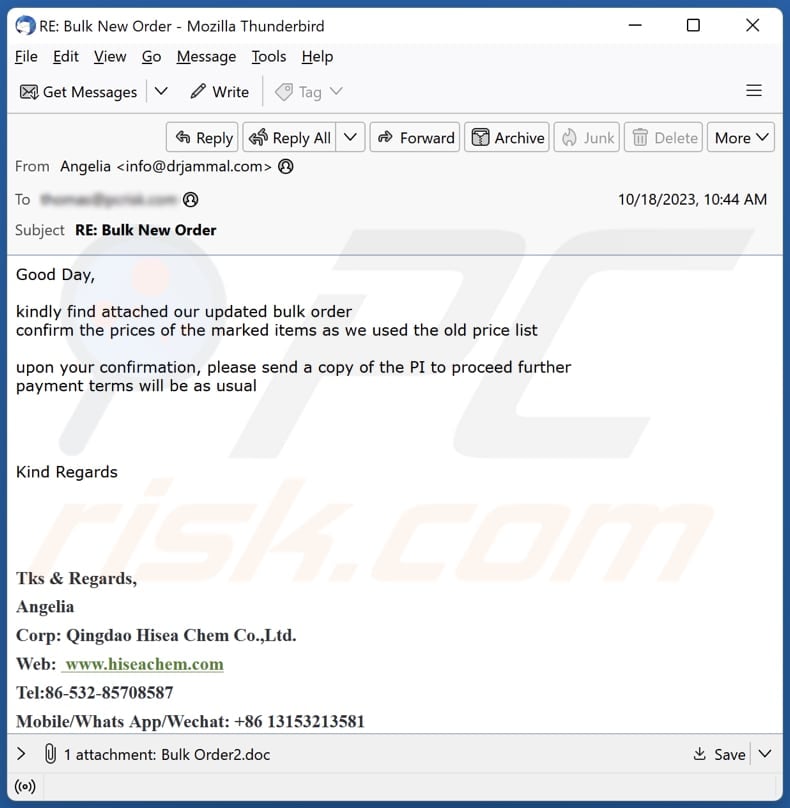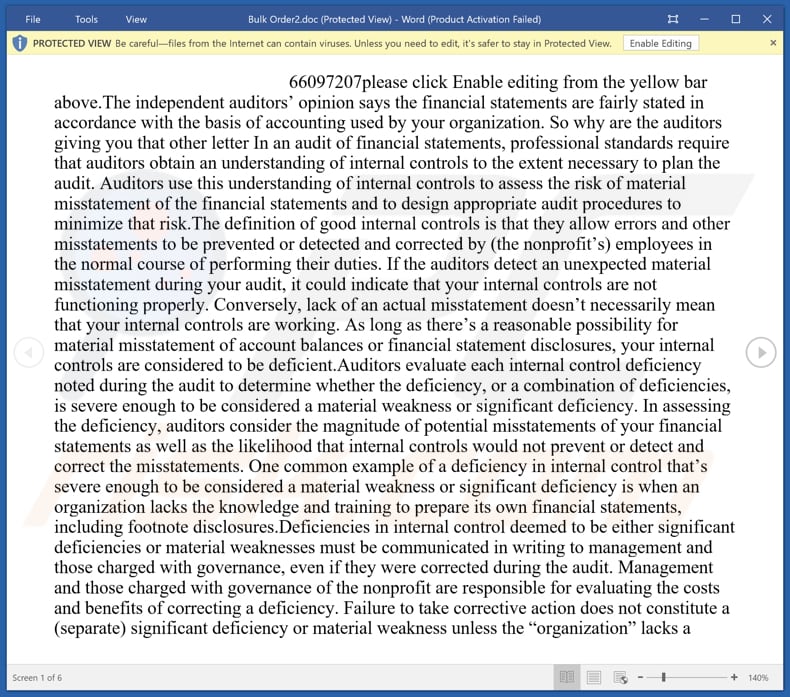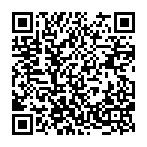How to avoid infecting computers via malspam campaigns like "Bulk Order"
![]() Written by Tomas Meskauskas on
Written by Tomas Meskauskas on
What is "Bulk Order"?
Following a comprehensive review of this email, it has been confirmed that it is a fraudulent message crafted to entice recipients into accessing the attached file. The main goal of the cybercriminals behind this scheme is to deceive recipients into unknowingly executing malicious software on their computers.

"Bulk Order" malspam campaign in detail
In this fraudulent email with the subject "Bulk New Order", the sender, Angelia, who claims to represent the company Qingdao Hisea Chem Co., Ltd., addresses the recipient in a seemingly professional manner. The email implies that there is an attached updated bulk order for the recipient's consideration.
The email urges the recipient to confirm prices based on the old price list and requests the recipient to send a copy of the PI (Presumably, a Proforma Invoice) once they confirm the prices. It is stated that payment terms will remain unchanged. The signature at the end of the email includes contact details.
The file attached to this email is a Microsoft Office document named "Bulk Order2.doc" (its name may vary). It contains text that appears to be discussing the importance of internal controls in the context of financial audits for organizations. In the first sentence, users are instructed to click the "Enable editing" button.
Clicking on that button initiates the injection of malware. The attached document is confirmed to be distributing Agent Tesla, which is a Remote Access Trojan (RAT).
Agent Tesla is a well-known and malicious RAT that has gained notoriety in the realm of cyber threats. This sophisticated malware tool is designed to provide cybercriminals with unauthorized access and control over an infected computer, thereby enabling them to steal sensitive information, monitor user activities, and carry out various malicious actions.
Thus, users should be aware of fraudulent emails containing malicious links or files to avoid infecting computers with RATs and other forms of malware.
| Name | Bulk Order malspam campaign |
| Threat Type | Remote Administration Trojan |
| Hoax | Recipients need to confirm prices in the attached document |
| Attachment(s) | Bulk Order2.doc (its name may vary) |
| Detection Names | Avast (Other:Malware-gen [Trj]), Combo Cleaner (Exploit.RTF-ObfsObjDat.Gen), Fortinet (MSOffice/CVE_2018_0798.BOR!exploit), Kaspersky (HEUR:Exploit.MSOffice.CVE-2018-0802.gen), Symantec (Exp.CVE-2017-11882!g6), Full List Of Detections (VirusTotal) |
| Symptoms | Remote Access Trojans are designed to stealthily infiltrate the victim's computer and remain silent, and thus no particular symptoms are clearly visible on an infected machine. |
| Payload | Agent Tesla RAT |
| Distribution methods | Infected email attachments, malicious online advertisements, social engineering, software 'cracks'. |
| Damage | Stolen passwords and banking information, identity theft, the victim's computer added to a botnet. |
| Malware Removal (Windows) | To eliminate possible malware infections, scan your computer with legitimate antivirus software. Our security researchers recommend using Combo Cleaner. |
Similar emails in general
Fraudulent emails with malicious links or attachments often share common characteristics that can serve as warning signs. These include unsolicited or unexpected messages from unknown or suspicious senders. They may contain urgent or threatening language designed to pressure recipients into taking immediate action.
Furthermore, these emails may exhibit poor grammar, spelling errors, or inconsistencies that raise suspicion. The sender's email address may not match the purported organization, and the email's subject or content could be unrelated to the recipient's usual interactions.
In many cases, the attachments or links within these emails are disguised as legitimate files, such as PDFs or Word documents, with the intention of delivering malware or phishing schemes.
Examples of emails used to deliver malware are "PMR Law Group Email Virus", "Barclays Payment Advice Email Virus", and "WebMail Server Manager Email Virus".
How did "Bulk Order" infect my computer?
The attachment included with this email is a harmful Microsoft Office document. When the recipient opens the document and allows macros to run (enables editing), it initiates the execution of malicious code that is hidden within the document. Enabling macros acts as a catalyst, causing the document to download Agent Tesla RAT.
How to avoid installation of malware?
In order to steer clear of malware threats, it is imperative to exercise vigilance when it comes to opening email attachments, particularly if the sender's authenticity is uncertain or the content appears dubious. Additionally, maintaining the latest security updates for both software and operating systems is a crucial step in fortifying your defenses against known vulnerabilities that malicious actors may exploit.
Further measures to safeguard your computer include refraining from engaging with advertisements, links, or pop-ups on suspicious pages and abstaining from downloading pirated software, cracking tools, or key generators. It is advisable to stick to official websites and app stores when acquiring applications and files while avoiding alternative sources.
If you have already opened "Bulk Order" attachment, we recommend running a scan with Combo Cleaner Antivirus for Windows to automatically eliminate infiltrated malware.
Text presented in the "Bulk Order" email letter:
Subject: RE: Bulk New Order
Good Day,
kindly find attached our updated bulk order
confirm the prices of the marked items as we used the old price listupon your confirmation, please send a copy of the PI to proceed further
payment terms will be as usualKind Regards
Tks & Regards,
Angelia
Corp: Qingdao Hisea Chem Co.,Ltd.
Web: www.hiseachem[.]com
Tel:86-532-85708587
Mobile/Whats App/Wechat: +86 13153213581
Malicious attachment distributed via "Bulk Order" spam campaign:

Instant automatic malware removal:
Manual threat removal might be a lengthy and complicated process that requires advanced IT skills. Combo Cleaner is a professional automatic malware removal tool that is recommended to get rid of malware. Download it by clicking the button below:
▼ DOWNLOAD Combo Cleaner
By downloading any software listed on this website you agree to our Privacy Policy and Terms of Use. To use full-featured product, you have to purchase a license for Combo Cleaner. 7 days free trial available. Combo Cleaner is owned and operated by Rcs Lt, the parent company of PCRisk.com read more.
Quick menu:
- What is Bulk Order malspam campaign?
- Types of malicious emails.
- How to spot a malicious email?
- What to do if you fell for an email scam?
Types of malicious emails:
![]() Phishing Emails
Phishing Emails
Most commonly, cybercriminals use deceptive emails to trick Internet users into giving away their sensitive private information, for example, login information for various online services, email accounts, or online banking information.
Such attacks are called phishing. In a phishing attack, cybercriminals usually send an email message with some popular service logo (for example, Microsoft, DHL, Amazon, Netflix), create urgency (wrong shipping address, expired password, etc.), and place a link which they hope their potential victims will click on.
After clicking the link presented in such email message, victims are redirected to a fake website that looks identical or extremely similar to the original one. Victims are then asked to enter their password, credit card details, or some other information that gets stolen by cybercriminals.
![]() Emails with Malicious Attachments
Emails with Malicious Attachments
Another popular attack vector is email spam with malicious attachments that infect users' computers with malware. Malicious attachments usually carry trojans that are capable of stealing passwords, banking information, and other sensitive information.
In such attacks, cybercriminals' main goal is to trick their potential victims into opening an infected email attachment. To achieve this goal, email messages usually talk about recently received invoices, faxes, or voice messages.
If a potential victim falls for the lure and opens the attachment, their computers get infected, and cybercriminals can collect a lot of sensitive information.
While it's a more complicated method to steal personal information (spam filters and antivirus programs usually detect such attempts), if successful, cybercriminals can get a much wider array of data and can collect information for a long period of time.
![]() Sextortion Emails
Sextortion Emails
This is a type of phishing. In this case, users receive an email claiming that a cybercriminal could access the webcam of the potential victim and has a video recording of one's masturbation.
To get rid of the video, victims are asked to pay a ransom (usually using Bitcoin or another cryptocurrency). Nevertheless, all of these claims are false - users who receive such emails should ignore and delete them.
How to spot a malicious email?
While cyber criminals try to make their lure emails look trustworthy, here are some things that you should look for when trying to spot a phishing email:
- Check the sender's ("from") email address: Hover your mouse over the "from" address and check if it's legitimate. For example, if you received an email from Microsoft, be sure to check if the email address is @microsoft.com and not something suspicious like @m1crosoft.com, @microsfot.com, @account-security-noreply.com, etc.
- Check for generic greetings: If the greeting in the email is "Dear user", "Dear @youremail.com", "Dear valued customer", this should raise suspiciousness. Most commonly, companies call you by your name. Lack of this information could signal a phishing attempt.
- Check the links in the email: Hover your mouse over the link presented in the email, if the link that appears seems suspicious, don't click it. For example, if you received an email from Microsoft and the link in the email shows that it will go to firebasestorage.googleapis.com/v0... you shouldn't trust it. It's best not to click any links in the emails but to visit the company website that sent you the email in the first place.
- Don't blindly trust email attachments: Most commonly, legitimate companies will ask you to log in to their website and to view any documents there; if you received an email with an attachment, it's a good idea to scan it with an antivirus application. Infected email attachments are a common attack vector used by cybercriminals.
To minimise the risk of opening phishing and malicious emails we recommend using Combo Cleaner Antivirus for Windows.
Example of a spam email:

What to do if you fell for an email scam?
- If you clicked on a link in a phishing email and entered your password - be sure to change your password as soon as possible. Usually, cybercriminals collect stolen credentials and then sell them to other groups that use them for malicious purposes. If you change your password in a timely manner, there's a chance that criminals won't have enough time to do any damage.
- If you entered your credit card information - contact your bank as soon as possible and explain the situation. There's a good chance that you will need to cancel your compromised credit card and get a new one.
- If you see any signs of identity theft - you should immediately contact the Federal Trade Commission. This institution will collect information about your situation and create a personal recovery plan.
- If you opened a malicious attachment - your computer is probably infected, you should scan it with a reputable antivirus application. For this purpose, we recommend using Combo Cleaner Antivirus for Windows.
- Help other Internet users - report phishing emails to Anti-Phishing Working Group, FBI’s Internet Crime Complaint Center, National Fraud Information Center and U.S. Department of Justice.
Frequently Asked Questions (FAQ)
Why did I receive this email?
Threat actors dispatch identical messages to numerous recipients, banking on the hope that at least one person will be deceived. These spam emails lack personalization or individualization.
I have downloaded and opened a file attached to this email, is my computer infected?
The attached file, a malicious MS Office document, can infect computers upon enabling macros through user interaction. However, if the file is opened with an older version of MS Office released before 2010, it can infect computers without any additional action or interaction required.
I have read the email but did not open the attachment, is my computer infected?
Opening an email itself is generally harmless. System infections typically occur when recipients click on links within the email or open attached files, which may contain malicious content.
Will Combo Cleaner remove malware infections that were present in email attachment?
Combo Cleaner has the capability to detect and remove nearly all well-known malware infections. It is important to note that advanced or high-end malware often hides deep within the system. Therefore, it is essential to perform a comprehensive system scan to ensure thorough detection and removal.


▼ Show Discussion